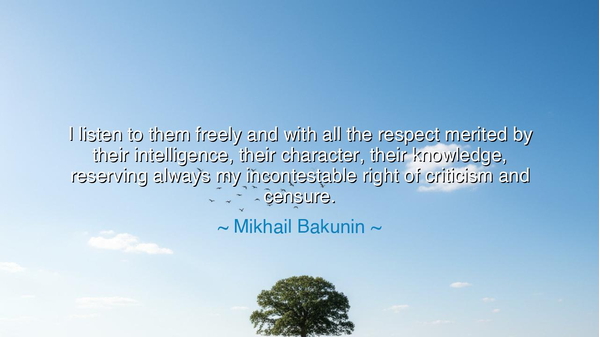
I listen to them freely and with all the respect merited by their
I listen to them freely and with all the respect merited by their intelligence, their character, their knowledge, reserving always my incontestable right of criticism and censure.






The words “I listen to them freely and with all the respect merited by their intelligence, their character, their knowledge, reserving always my incontestable right of criticism and censure,” were spoken by Mikhail Bakunin, the fiery 19th-century philosopher and revolutionary. They are the utterance of a man who sought not blind rebellion, but intellectual freedom, the courage to hear all voices without surrendering his own. In this declaration lies the essence of wisdom—the balance between openness and independence, between respect and discernment. It is a creed not only for the scholar or the statesman, but for every soul that seeks truth in an age of noise and persuasion.
Bakunin, though a man of revolt, was not a man of chaos. His words reflect a profound respect for dialogue and reason, yet a refusal to become enslaved by authority, however wise or eloquent it may seem. To “listen freely” is to open one’s mind to others with humility, acknowledging their gifts and insights. But to reserve the right of criticism and censure is to remain sovereign over one’s own judgment—to weigh words not by power or position, but by truth. Thus, Bakunin teaches us that freedom of thought is not disobedience, but the highest form of integrity.
Throughout history, this tension between reverence and independence has tested great thinkers. Consider Galileo Galilei, who stood before the might of the Church, listening to the voices of learned men who condemned his vision of the heavens. He respected their learning, but he would not silence the truth his eyes had seen. He, too, reserved his “right of criticism”, though it cost him his freedom. In his defiance, Galileo lived Bakunin’s principle centuries before it was spoken: to honor wisdom, but not to worship it.
Bakunin’s words are also a warning to every age. Societies, governments, and even schools often seek to create obedience in the name of harmony. Yet obedience without thought is not peace—it is decay. To listen without the right to question is to trade one’s mind for comfort. The truly wise do not fear criticism; they invite it, knowing that truth grows sharper when struck by the hammer of inquiry. Thus, the “incontestable right of criticism” is the breath of liberty—it keeps the mind alive, honest, and awake.
But Bakunin does not call for arrogance or cynicism. His words begin with respect. He reminds us that humility is the gateway to understanding. To reject all voices but one’s own is folly; to follow all voices but one’s own is slavery. True freedom lies between the two—to listen with reverence, to think with courage, and to speak with conscience. For wisdom is not found in silence or shouting, but in the stillness of discernment.
Let us, then, learn from his creed. In your own life, listen deeply to others—the elders, the teachers, the thinkers, the friends. Honor their experience and their knowledge, for each carries a fragment of the world’s truth. But never abandon your inner sovereignty. Weigh their words with care, question them with love, and hold fast to what rings true within your soul.
For the greatest danger of our time is not ignorance, but submission—the quiet surrender of thought to voices louder than our own. Resist this. Let your mind be both open and anchored, your heart both humble and brave. Remember always Bakunin’s wisdom: to listen freely, but to judge independently, for in that balance lies the power to remain both a student of the world and the master of your own spirit.
Thus, O seeker of truth, when you stand among many voices—some wise, some deceiving—do as Bakunin did: listen with respect, think with clarity, and speak with courage. For freedom begins not in rebellion against others, but in fidelity to the truth within oneself.






AAdministratorAdministrator
Welcome, honored guests. Please leave a comment, we will respond soon